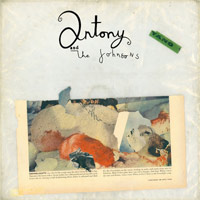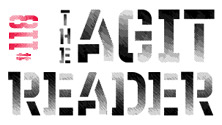
Swanlights
Secretly Canadian
I’m kind of surprised, actually, that Antony Hegarty (and his Johnsons) had anything left to give after The Crying Light. That record, an out-and-out masterpiece, was so rich with passion and yearning that I wouldn’t have been surprised if we didn’t hear from them for quite some time. But maybe that’s what makes Antony so special, that he has yet to plumb his depths, that there’s a bedrock of song that goes on for miles down there. Perhaps he’s a little tentative, though, about what comes up when he digs so deep, and maybe that explains the relatively baroque content of Swanlights. There are a lot of beautiful sounds on this record—pretty melodies, unusual dissonance, and titillating combinations of instrumental and vocal timbres—but nothing quite so moving as Antony’s previous missives.
A lot of the record comprises some very dramatic minimalism. The opener, “Everything Is New,” is heated enough, but utilizes only three words and one melodic line; it’s clearly an intro. Further on, instrumental figures on flutes, strings and organs repeat endlessly for the length of a track (as on “I’m in Love” and “The Great White Ocean”). “Fletta,” the much looked forward to duet with Björk, is accompanied by nothing but a piano and the pair’s multi-tracked voices. A neat trick, but the song leaves you hungry for more. The title track develops slowly and, well, minimally, building pianos on top of a deep drone and numerous layers of Hegarty’s vocal improvisations, but is too abstract to make much of an impression. And “Christina’s Farm” takes a full three minutes before it locks into so much as a rudimentary rhythmic consistency. Though that final track, like the one before it, does climax powerfully, Antony leaves it to the orchestra to handle the final, emotional moments on their own, as if he’s already spent. Choose your own metaphor, but for my taste, it’s a gorgeous album in many ways, but a little like getting nothing but appetizers when you know how amazing the main course can be.
Matt Slaybaugh

Turning On
Carpark
We’ve sung the praises of Cleveland’s Cloud Nothings before—as recently as last week actually. Yet even though this debut for Carpark is a reissue of old material, it’s worth speaking directly to the brilliance of Turning On. First issued as a cassette, then on vinyl, and now on CD with a pair of songs from a 7-inch put out by Group Tightener and another two from another cassette, Turning On has continued to be reborn, debuting again and again. It’s with good reason, as more people discover the rust-tinted pop made by this one-time one-man recording project turned band. Like a long lost response to the Daytonian pop of the ’90s (GBV, Brainaic, etc.), the Nothings send out their wistful transmissions over fuzzy chords. “Hey, Cool Kid” sounds like morse code, it’s pop nodes sent as a series of dots and dashes some years earlier only to emanate in this ragged, but no less poignant form. Elsewhere songs like “Old Street” and “Water Turns Back” are reminiscent of a time when “lo-fi” meant four-track cassette and not GarageBand. Turning On will stand up to whatever accolades are heaped upon it as it inherently comes from a place of pure intentions.
Stephen Slaybaugh
MP3: “Hey Cool Kid”

Steeple
Jagjaguwar
While playing it retro has always been a popular commodity for those musicians psych-inclined, it seems like recently the measuring stick used to level praise or fraudulence towards a band is marked in inches of authenticity. Blues seems to never leave the woodshed, and as a result, its ghosts are often defiled by countless bands every day (likely down the street at your neighborhood sports bar). Then again, the Black Keys and Mount Carmel, carbon-copies though they may appear at first, win their crowds and cred with the amount of soul put forth upon their respective elders. Be it Delta or British blues, respectively, it usually feels “real,” eliciting instinctual enjoyment. Those that transcend slight imitation, those bands that reach the upper echelon of psych-revival movements (especially in the present), usually make their efforts quite implicit, managing to kick up a cloud of hallucinogenic dreamscapes and nightmares all their own.
Dungen comes to mind, for at first mining a specific Canterbury sound and now weaving a tapestry of rich head-music. Wolf People gave that sense with Tidings, but it was an album more of ideas and fragments pulling from double-albums by Jethro Tull and soupy, rainy-day, woodland psych via Traffic, or the Moody Blues even. Jack Sharp promised Steeple would be the first “real” statement for Wolf People. And consequently, Steeple is a cohesive mass of mountainous riffs and intriguing psych-trails. Just try and follow Sharp’s lead throughout—that is when you’re not tuning to his foggy and proper Winwood-esque voice. Among songs about the craggy British landscape of which they are bred and modern-day wizards and castles, Sharp and his band pour on the virtuosity, playing like they’ve survived endless tours across the smoky clubs of the 1970s. It’s all very soothing despite the ferocity of the Sabbath-crusted “One By One for the Doorney Reach” or the black magic veil that surrounds “Painted Cross.” Like that classicism, Steeple is also very reminiscent of a time when guitar solos lasted minutes and songs told intricate, page-turning stories, as is the case with the two-parted “Banks of the Sweet Dundee.” Yet even in the brief “Morning Born,” Wolf People set out on a journey that travels well beyond their painting-by-numbers peers. Steeple is worth suspending disbelief that this isn’t a record from the bins of a Birmingham thriftstore and instead something that can actually replace a Caravan album or two.
Kevin J. Elliott
MP3: “Tiny Circle”

Valusia ep
Sacred Bones
Another artist for whom we’ve professed our admiration before, Zola Jesus has been kind enough to never keep us wanting for new music for long. In the few short years since she emerged on a crimson wave of EPs, she’s continued to keep us saturated with long- and extended-plays. That she’s continually expanded upon her darkened aesthetic and progressed as both a singer and a musician has made it necessary to never overlook a single iteration.
Valusia, Zola’s new four-song EP, continues down the road she began forging with the Stridulum. It’s a clearcut path, one devoid of the noisy brambles that characterized her earlier work. Here, like on Stridulum, she approaches a pop realm while still remaining on the peripheral. And though while she may not like being pigeonholed by the “goth” tag (lord knows that term has been tainted far too often in the last couple decades), it’s apropos both in terms of the shadowy atmospherics she favors and the sense of drama she exudes. The leadoff “Poor Animal” continually escalates, big drum beats meshing with ethereal synth tones and Zola’s soaring voice. “Sea Talk,” while sharing many of the same elements, seems more intimate, Zola turning her voice inward to admit, “I can’t give you what you need.” With Valusia, Zola Jesus again reveals that goth can be something much more magical than just smeared mascara and lipstick traces.
Stephen Slaybaugh

One of Us
Afternoon
As far as bands go, Pomegranates, hailing from the Queen City, Cincinnati, are near and dear to my heart. Not simply because they’re from the town where I spent my blissfully naive childhood years, but also because, having formed a mere four years ago, Pomegranates have racked up an impressively deep resume that includes two full-length albums, two EPs and opening slots with Spoon, Islands, and Peter, Bjorn and John. So I suppose it should come as no surprise that for their third studio release, One of Us, Pomegranates have enlisted the mastertouch of TJ Lipple (of the band Aloha), who has worked with a roster of bands that includes MGMT and Headlights.
One of Us begins with a decidedly drowsy introduction, which carries out a fairly convincing post-rock impression, fooling us into thinking we’re being shoved another serving of bland, eyelids-half-open art-rock before launching into a psychedelic blitz of drums and intricately woven guitar riffs courtesy of Joey Cook and Isaac Karns. It continues with the catchy and endlessly sincere love song “50’s,” which evokes the relative simplicity and innocence of 1950s courtship to a tee. Afterwards, the album begins a rollercoaster of highs and lows, fasts and slows, love and longing. Just as the pace starts to pick up, sleepy tunes are haphazardly thrown between upbeat standouts, and for what? It would make sense if these slower songs were well crafted to showcase the Pomegranates’ diversity, but alas, spacey, lyric-less songs like “Perception” and “Venus” feel like intermissions amidst the better-structured tracks on the album. The reason for such interuptions remains unclear, but it does little for the conceptual flow of the album. It is here that Pomegranates relatively young age (as a band) is apparent. Still, this is a small glitch when compared to their penchant for crafting wonderfully whimsical and engaging tunes. While Pomegranates have won plenty of critical acclaim previously for their quirky brand of pop and psych-rock, One of Us exhibits the potential for commendation on a much larger scale.
Jennifer Farmer
ALBUM REVIEWS
Alain Johannes, Spark
Owen Pallett, A Swedish Love Story
Dark Dark Dark, Wild Go
White Dress, White Dress EP
Deerhunter, Halcyon Digest
The Corin Tucker Band, 1,000 Years
Half-handed Cloud, Stowaways
Pink Nasty, Pink Nasty
OMD, History of Modern
Abe Vigoda, Crush
Black Milk, Album of the Year
Chromeo, Business Casual
Dungen, Skit I Allt
James, The Morning After the Night Before
